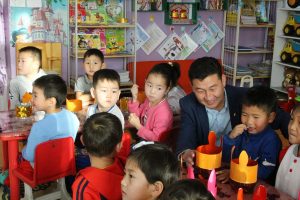-
What We Do
- WHERE WE WORK
-
About Us
 Welcome Message from Carol Jenkins
Welcome Message from Carol JenkinsFor more than 90 years, World Learning has equipped individuals and institutions to address the world’s most pressing problems. We believe that, working together with our partners, we can change this world for the better.
On my travels, I’ve had the opportunity to meet with many of those who have joined us in this mission. In Baghdad, we’ve trained more than 2,300 Iraqi youth who are already giving back at home. In London, our partners in the TAAP Initiative strongly believe that we are all responsible to practice inclusion. And in Vermont, our Experiment in International Living and School for International Training participants prove every day that they have the tools and the determination to change the world.
Please join us in our pursuit of a more peaceful and just world.
- Get Involved
Media Center > Story
Learn Why This Mongolian Kindergarten Principal Is Teaching Kids How to Recycle
February 23, 2018
Lundeejantsan Tsoodol believes you’re never too young to learn about keeping the environment clean — even if you’re in kindergarten.
As a kindergarten principal, Tsoodol is working to instill community values in his own students at Kindergarten #5 in the small Mongolian city of Arvaikheer. These children are learning how to sort trash for recycling, make toys and household items from used bottles or paper, and decorate their classrooms with pencil holders and flower pots made of recyclable materials.
Arvaikheer is the pilot site for Eco-Friendly Kindergartens, a project that Tsoodol launched alongside a team of participants from World Learning’s Leaders Advancing Democracy (LEAD) Mongolia program. Eco-Friendly Kindergartens is working with three kindergartens in different provinces to introduce the 3R principles: reuse, reduce, and recycle.
But the project is also about so much more: Tsoodol argues that just the mere act of recycling shows children that small actions can benefit their entire community. It will encourage them to become responsible citizens who engage in even bigger ways as they get older. “This work is important,” he says. “We want to build up kids who have the right attitude to achieve because they are our future.”
Tsoodol joined the LEAD Mongolia Program in late July as part of the In-Country Thematic Program along with 29 other emerging leaders from 15 different provinces of Mongolia. “When I applied to LEAD I only thought, ‘OK, I’m going to get some skills.’ I wasn’t sure what skills I would get or even what skills I wanted,” he said. “But I knew I wanted to improve myself.” LEAD brought him into a community he never realized existed.
LEAD Fellows are quickly becoming the country’s most promising change-makers. LEAD Mongolia is a leadership development program for up-and-coming democracy advocates run in partnership with the U.S. Agency for International Development (USAID). Those who take part vary in profession and background: some are young civil society activists, others are in local government or the private sector. The point is to bring them together to solve challenges and bring about change through group projects like Eco-Friendly Kindergartens.
From day one of LEAD, surrounded by other leaders with diverse experiences, Tsoodol says he quickly realized how much there was to learn. “Because of LEAD, I figured out what I didn’t know. And because of that, I figured out what I needed to learn and how I wanted to improve.”
Tsoodol realized he could find ways to ensure a solid start for his students despite serious challenges. Schools across the country are coping with overcrowding, including Kindergarten #5, which has enrolled 295 students despite being built to accommodate 140. Funding for public education has also stirred controversy in recent months. Teachers are one of the lowest paid groups of civil servants in Mongolia, paid between 535,000 to 608,500 Tughriks (around U.S. $250) a month. This has led to mass protests and threats of strikes. Many fear poor salaries are prompting skilled teachers to seek work in private schools, which offer higher pay, or seek work elsewhere altogether.

Still, Tsoodol remains undaunted. He doesn’t mind the extra students, especially during a period of high unemployment. “If we help one child, we help their family. If we can care for their child during the day, then they can find work and life can get better,” he explains.
Through projects like Eco-Friendly Kindergartens, too, he can help children build the foundations of their own lives. It sets an example for them of community involvement and it spurs hope — both for the kids and for the people around them. “The best part of this job is when you ask a kid, ‘What did you learn today?’ and you see their eyes widen,” he says. “When they learn something new, you can really see it in their confidence and you know there is hope for the future.”
Tsoodol offers an optimistic vision of that future. His school is alive with vibrant paintings on the wall and children’s art projects hanging in every room. Teachers greet visitors proudly as they show off classroom recycling projects. Parents and many others see this as not just a school, he says, but also a community hub that models what good community engagement looks like. “Schools are the heart of communities and we need to get them involved — students, teachers, parents,” he says.
It is clear that Tsoodol is doing exactly that. At Kindergarten #5, he is serving as a role model and demonstrating the democracy comes in all forms. As he learned through LEAD Mongolia, democracy is not forged by politicians in Ulaanbaatar but by the emerging leaders who create hope and allow for change to unfold in the most unexpected places and in unexpected ways.





